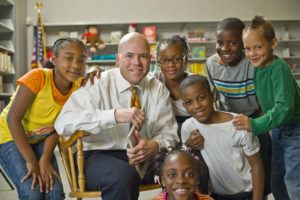
Patrick Hamner, SVP Commercial Banker
The month of April is celebrated as Financial Literacy Month, and as bankers, this is something we care about a lot. Throughout the month the Council for Economic Education (CEE) holds events to shine a spotlight on the importance of economic and financial education.
According to the CEE, industry leaders, scholars, and policymakers agree that economic and financial literacy is crucial to succeeding in modern society. But research shows that many lack even a basic understanding of these concepts.
This month, our bankers want to do their part in sharing advice and insights that they have learned over the years. They wish they had known all of this when they were 18 years old!
In this post, Patrick T. Hamner, our Senior Vice President of Commercial Banking, shares his story in his own words. Visit our social media throughout the month for words of advice from a few other Bryant Bankers as well.
Life’s lessons on financial literacy
They teach us a lot in high school and college, but somewhere I missed the boat when it came to “life’s lessons” on financial literacy.
Looking back, there was one person who was instrumental in sitting me down and explaining the very basics of Credit 101. From these basic principles, I was lucky enough to avoid most of the common pitfalls that young people encounter. It was a pretty simple formula, and the lessons my dad provided took less than an hour, right before he left me in Tuscaloosa and I was on my own for the first time ever. It was 1989.
Here are a few of the first crucial steps I took and things I learned from my dad on that day:
We went to see Jimmy Mills, a well-known Tuscaloosa banker on the University Campus at the time, and I opened my first checking account. Got a lecture.
Just because you have checks does not mean you have money. Balance your checkbook each month. If the check is written, assume the check has been cashed, and don’t try and ride the float. You’ll lose. Another lecture.
Your credit (or lack thereof) and your name are all you have at this point. If you pay your rent and your utilities as agreed, you’ll have no problems with your credit, and it will protect your name. No lecture, just the look.
Your credit card is for emergencies only. If you think it’s an emergency, you need to have the money to pay it off when the bill comes. I had a little different definition of emergency then he did, so this one bit me a couple of times.
You worked hard for the money you have. Think before you spend it. I thought about it and I spent it.
These simple things stuck with me during college. Yes, I had some slip-ups that had to be handled, but overall, I came out unscathed and without a pile of credit card debt, unlike many of my friends who graduated with thousands of dollars in credit card debt and no way to get caught up.
I began working at a bank in college, so I had no reason not to balance my checkbook. I’d get fired if I bounced a check. Pretty easy math at that point, but what if I hadn’t gotten that job? Would I have really taken my checking account, ATM card, and credit that seriously?
From this point and after another 20 years of adult life with joint bank accounts, mortgages, insurance (life, property, riders, etc.), taxes, etc., I’d like to think I have most of it figured out, but there had to have been a set of Cliffs Notes on all of this, didn’t there? Why didn’t I know about all this stuff earlier? Why wasn’t there a class on “Real Life” in high school or college? Where was Junior Achievement (JA) when I was in elementary, junior, and high school?
JA is a global program geared towards teaching kids (K-12) the importance of financial literacy, work-readiness, and entrepreneurship. Volunteers from the business world go into the classrooms and teach age-specific courses on credit, taxes, government, loans, interest, budgeting: it’s Credit 101. It’s the same classes for a first grader in Tuscaloosa as it is for a first-grader in NYC, carrying on through more concentrated courses as students get closer to graduating to the “Real World.”
When asked to join the local JA board in the early 2000s, I had no idea that I’d found the Cliffs Notes I had wondered about, the shortcuts and roadmaps to help avoid financial pitfalls. Nearly 20 years later, that coursework is still relevant and still being taught in many of our Tuscaloosa City and County schools, along with several of the private schools in Tuscaloosa. Bryant Bank has been a great advocate for JA, not just financially, but by allowing many of us time away from work so we can go into the classroom to talk to students. Hopefully, we are instilling some nuggets that will help them financially as they grow up and prepare for life after the 3 p.m. bell.
Little did I know that the positive effect Junior Achievement would ultimately have on me would allow me to hopefully have a positive effect on other young students as well.
We hope Patrick’s story has a positive impact during Financial Literacy Month and beyond.
OUR BANKERS IN ALABAMA WOULD LOVE TO WORK WITH YOU!
At Bryant Bank, family is at that heart of what matters most. And for us, Alabama is that family. Our vision is to see Alabamians experience a financially stable future and live in a thriving community. To accomplish this, Bryant Bankers put care into action each day to help others invest in their full potential. We are proud to offer Personal, Business, and Mortgage Banking services. Click here to locate your closest Bryant Bank to open an account with us today.
Member FDIC.
Equal Housing Lender.
NMLS 582857.

